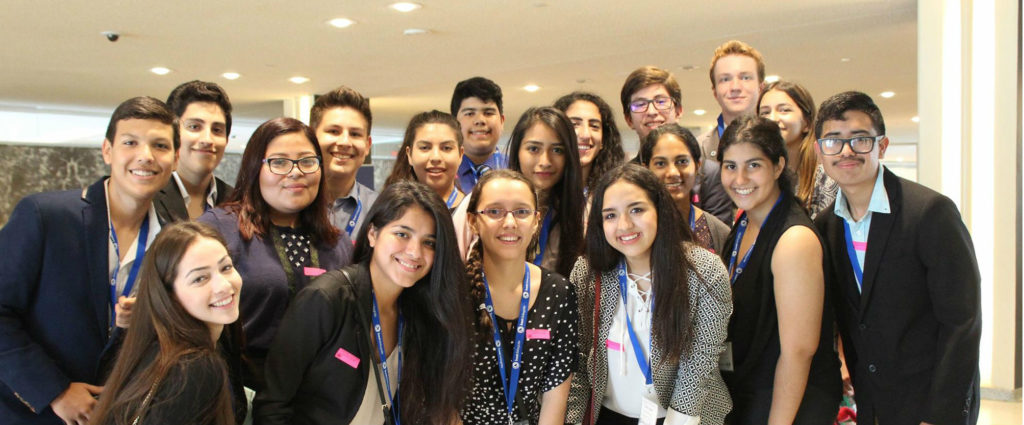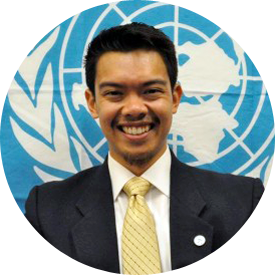in·cred·i·ble
adjective
1. impossible to believe
2. extraordinary
For educators, Model UN is an “incredible” experience.
It’s incredible seeing your students go to a Model UN conference — instead of playing video games or going to the mall, your students are willing to wear suits and work on a weekend to solve the world’s biggest problems.
Model UN is “impossible to believe.”
It’s incredible seeing your students stand up to speak, especially your shyest student — someone you never suspected would be interested in something like this — seeing them get in front of their peers, shaking so hard with nerves that the written speech in their hand is rattling loud enough for you to hear — and seeing them deliver an articulate, passionate speech about a global issue.
Model UN is “extraordinary.”
And if it’s an incredible experience for you as an educator, just imagine what your students are going through.
They’re going through all these emotions — the fear of public speaking, the nervousness of meeting new people, the passion of a fiery speech — the effort required for successful negotiation and lobbying — the drama of debate, the pride of passing a resolution.
While, at the same time, they’re engaging really big problems — eradicating extreme poverty, ending civil war, protecting human rights, combating climate change.
Perhaps the most incredible part is seeing the “light bulb” turn on your student’s mind — from learning something new, from gaining a new experience, from seeing a different point of view.
Model UN is an incredible experience because it pairs emotion with learning. Your students are learning so much, they don’t even realize it.
And as their teacher, you want to know, “How do I help? What am I supposed to do? Now what? When they come to you with questions about their topics, countries, or policies, you want to help them do research. When they ask you how to approach a particular situation in committee, about or how to write a resolution with other students, how to negotiate with a difficult delegate, you want to give them useful advice.And when it comes to leading your club, you want to help them because it develops their leadership skills — and it helps you!
The better your students can lead, the less you need to manage, freeing your time up to focus on the actual learning, and being the club’s champion to other teachers and administrators.

But several challenges face many educators in Model UN.
1. Most educators never did Model UN when they were students.
So when your students come to you with questions, you do your best to help out. You lean on the experience of your student leaders. You reach out to other, more experienced Model UN directors. But it’s not the same as helping — or teaching — from experience.
2. It takes takes significant time and effort to learn Model UN.
As an educator, time is your most valuable resource. You are busy grading homework, supervising after-school and lunch activities, responding to parents and administrators — let alone teaching a full class load! And then you have to put in additional hours after school and on weekends to learn MUN.
3. It’s not always clear what you’re actually supposed to do as the Model UN director.
When you’re new to Model UN, you have to trust your student leaders know what they’re doing. You have to trust that they know how to train fellow students and lead the club to conferences. But how do you know if they’re doing things “right”? And if you don’t know what’s “right,” then how do you hold your students accountable to what they’re supposed to do?
4. Model UN can be confusing because every committee, conference, and club does things differently.
You already have to spend time learning this new Model UN vocabulary — it doesn’t help that different committees, conferences, and clubs seem to speak different languages. For example, you walk into one committee, and students are speaking according to a written speakers list. Then you walk into another committee, and students get to speak when the chair calls on them — but how does the chair know whom to call? And you walk into a third committee, and there doesn’t seem to be any order at all — students are up and out of their seats, and some are trying to speak really loudly — and even talk over other students. It just seems like chaos.
5. There don’t seem to be any clear “standards” in Model UN.
And that gets to the heart of most challenges facing educators when they’re new to Model UN. Model UN is a highly decentralized activity — there’s no central governing organization for Model UN. Without centralized governance, historically there has been a lack of centralized standards, resources, and training — which is why there have been so many barriers to learning MUN.
Without standards for MUN, it’s difficult to define clear student outcomes and align them with broader education standards, such as US Common Core or IB Learner Profile. And without standards alignment, it’s difficult to get schools to be more supportive of MUN programs.
These challenges are the reasons why we started Best Delegate — to help students and educators learn Model United Nations — and why we’re proud to announce the launch of MUN Education.
MUN Education is a Best Delegate initiative to help schools build Model UN programs.
We are focused on empowering educators — the Model UN directors, advisors, coaches, moderators, and FAs — the teachers, administrators, and parents — who want to see their students and children succeed in Model United Nations.
On the new MUN Education website, you’ll find free Model UN resources specifically for educators — from explaining what Model UN is and how MUN supports college readiness — to Common Core-aligned MUN unit plans — and MUN conference preparation guides and country placard sets.
You’ll learn how we empower educators and their students through Model UN training and professional development programs, including workshops, online training, curriculum, and our flagship MUN Advisor Institute.
And you’ll see how we’ve impacted schools, non-profits, government agencies, and entire school districts in 40+ countries through institutional Model UN partnerships.
At Best Delegate, we’re a team of educators working to achieve “MUN for ALL” — we want to create a world where Model United Nations is an empowering educational experience that is available and accessible to all students and educators.
I hope you and your students find our resources useful. I hope you and your students find our training impactful. And I hope we can work together to create a world of “MUN for ALL.”
Ryan Villanueva
Co-Founder & Education Director
Best Delegate | Model United Nations
